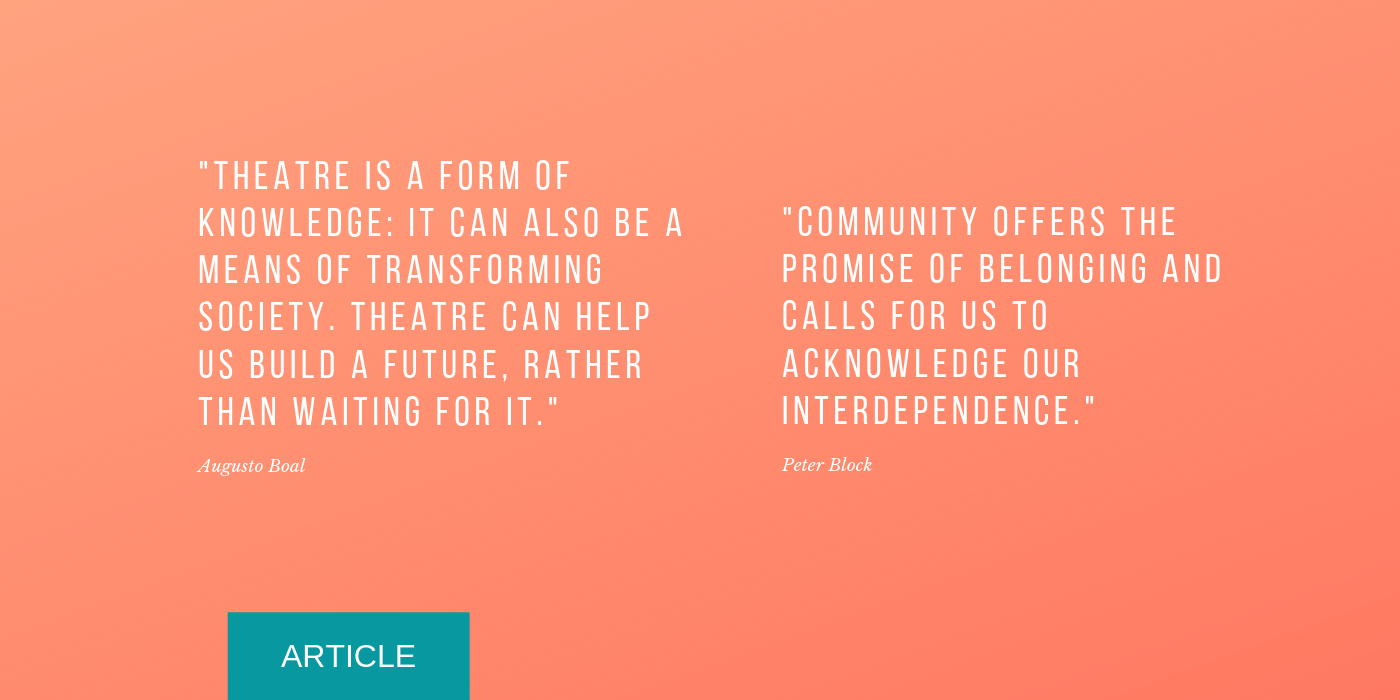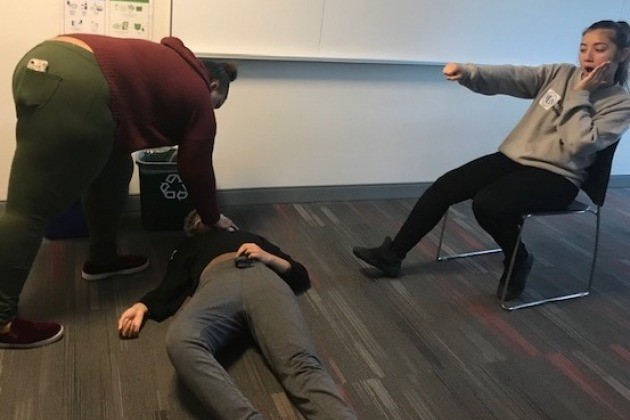
Strongly influenced by Paulo Freire’s Pedagogy of the Oppressed, Brazilian activist and director Augusto Boal created Theatre of the Oppressed (TO) in the 1970s. TO comprises a series of techniques combining performance and participation, inviting audiences to envision liberation and empowering them to resist oppression. If successful, TO catalyzes social change.
Boal argues that traditional theater has been used as a tool of domination by the ruling class, with audience members as passive witnesses to the narrative presented by actors on the stage. In TO, on the other hand, actors and audience members alike are “spect-actors,” active participants and transformers of the theatrical act (Boal, 1979, p.122). Spect-actors analyze the performance and suggest interventions, then try them out on stage to determine whether they might work in real life.
Boal’s “hypotheses” include metaxis, the ability to be in two places at the same time. We can be both in the theater and wherever the on-stage action takes us. Boal’s goal was for the two realities to merge, for the solutions rehearsed in the theater to create change in the real world.
TO also features games that encourage participants to connect with one another and to facilitate “de-mechanization,” Boal’s term for unlearning the habits we’ve adopted as participants in the world of work and mainstream culture.
Act4Change
Bronx-based Act4Change utilizes TO methodology to help participants, especially children and teens, become creators and co-owners of their respective communities. Community, in the sense of a supportive environment characterized by a strong sense of safety and belonging (Gereluk, 2008), is integral to individual and collective well-being. Students who feel connected to their classmates and to the adults in their lives are more likely to thrive both socially-emotionally and academically. The adults in a cohesive community can more effectively problem-solve and advocate for themselves. However, community can be difficult to create and maintain in low-income working-class neighborhoods whose participation in the public sphere has been curtailed, if not negated completely. Poverty and racism cause exceptional stress and trauma and create obstacles to cultivating cohesive communities, bound together by relationships, a feeling of safety, a sense of belonging, and individual and collective efficacy.
Using interactive theater arts to work with participants as equal partners in imagining their local future, Act4Change is a community engagement pedagogy designed to highlight truths and create possibilities for communal interventions. It incorporates participatory and critical pedagogy to drive the individual and community potential of young people in oppressed communities and develop strategies for social change.
Vested in the educational development of youth, Act4Change draws on principles of creative transformation that encourage youth to explore the social conditions of their environments. It aims to have participants gain a greater sense of self and to serve as resources to their peers and communities. Act4Change projects aspire to inform public life, inspiring and educating community members to address the social issues in their neighborhoods. Furthermore, these projects call for personal and community growth. As a practice of community engagement pedagogy, it combines community, theater, and education to center what Block (2008) calls kitchen table and street corner democracy.


Images: Act4Change
Act4Change Presentation
On December 14, 2018, 78 residents of the South Bronx, including children, teens, and adults, attended “What You Gonna Do About It?” an Act4Change Forum Theater program on bullying. Youth and adults members presented and discussed their lives as fiction and intervened in its truth. The program engaged the spect-actors in a dialogue on the social reality of bullying in their schools. In addition, participants experienced the theatrical act as conscious intervention, a rehearsal for social action rooted in a collective discussion on school bullying. The participants continued to discuss bullying as a system of behaviors during the “design for equity” table talk dinner that followed the performance. Performers went to each table and asked the participants whether they had experienced bullying. They discussed how the community could approach the problem of bullying. Participants had to challenge their belief that individual responsibility was the sole avenue for addressing bullying.
During the interactive performance, participants were engaged in problem-solving. During the dinner, they discussed in more detail the cultural and social nuances of bullying. As participants came to see bullying through multiple perspectives as a course of conduct and an accumulation of acts over time, they were inspired to consider ways to make their communities more aware of how to cope with it. The Act4Change project, once completed, brought different possibilities to the forefront and gave voice to children, teens, and adults. To a certain extent, “What You Gonna Do About It?” brought to bear how bullying is constructed.
That evening children, teens, and adults tackled bullying as individuals and as part of a community. Audience members were active participants, spect-actors, and took collective ownership of devise ideas for liberation from bullying. They were called upon to view themselves as system change agents, not merely from the standpoint of individual responsibility but from the possibility of collective responsibility. They built a public interest mindset using their collective creativity to frame the problem of bullying. Community interventions were created and served as a key element in thinking in a more just way on how to deal with the conditions of social life.
By utilizing TO methodology in educational settings, Act4Change facilitates constructive problem-solving and community-building. By working collaboratively to solve staged ethical dilemmas, participants of all ages begin to view themselves as change agents and to deepen their understanding of the centrality and potential of community in transforming society.
Boal, A. (1979). Theatre of the Oppressed, trans. Charles A. and Maria-Odilia Leal McBride (New York: Theatre Communications Group, 1979).
Block, P. (2008). Community: The structure of belonging. San Francisco, CA, US: Berrett-Koehler Publishers.
Gereluk, D. (2008). Education and community. 1st ed. New York: Bloomsbury Academic
Cultural worker and action researcher, Eva Lopez, founder of Act4Change, is a teacher, community-based organization administrator, and Theatre of the Oppressed facilitator. E-mail: Act4ChangeEL@gmail.co
